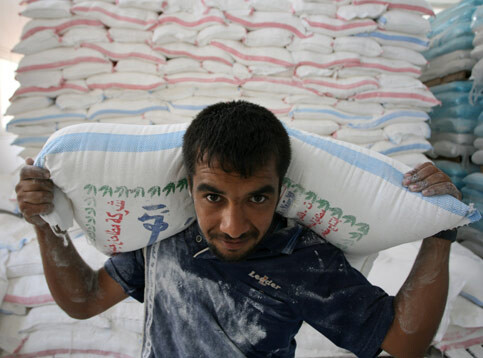The Electronic Intifada 6 August 2008

A Palestinian refugee receives food from a UNRWA food distribution center in Gaza city, July 2008. (Wissam Nassar/MaanImages)
JERUSALEM (IRIN) - An Israeli parliamentary caucus has been formed to look at “solutions” to the Palestinian refugee problem, now in its 60th year.
“The idea of the caucus is to look at the refugee problem from a humanitarian perspective, not to focus on why there are refugees, but to look at solutions,” a spokesman for member of parliament Amira Dotan, a co-chairperson of the group, told IRIN.
Dotan, a member of the ruling Kadima party, told IRIN: “The caucus is an attempt to conduct a dialogue with UNRWA [the UN agency for Palestine refugees] and not an attempt … to force a solution,” she said.
UNRWA, with a labour force of some 26,000 “drawn almost exclusively from the Palestine refugee community,” provides humanitarian assistance to some 4.6 million Palestinian refugees, including their descendants, from the 1948 war, in Lebanon, Syria, Jordan and the occupied Palestinian territory.
However, it is far from clear whether this is really an attempt to talk to UNRWA and see how the refugee issue can be humanely solved.
The man behind the initiative and the other co-chairperson, Beni Alon, has a much more radical answer to the refugee question, which in Israel is known as “transfer” (meaning the forced relocation of most of the Palestinian refugees from the occupied Palestinian territory to third countries): The refugees already in Arab states, many of whom still live in dilapidated camps, would be “resettled” there — whether they and the host countries liked it or not.
Some years back, Alon, a former cabinet member, launched what he called the “Israeli Initiative” in which he spelled out his plan to rearrange the demographics of several countries in the Middle East.
Dismantling of UNRWA?
The Initiative refers to UNRWA as a “problematic factor” and suggests dismantling the agency and transferring its humanitarian mandate to the UN Refugee Agency (UNHCR), which would be tasked with participating in resettling the refugees and their descendants.
In a phone interview with IRIN during a trip overseas Alon reiterated his position, saying moving the refugees around and closing UNRWA was the “humanitarian solution” to the problem. He admitted, though, that he had not looked into all the legal issues around his “solution.”
By and large Palestinian refugees continue to demand the right to return to their pre-1948 villages in what is now Israel.
Christopher Gunness, a spokesman for UNRWA, said his agency supported a political solution to the refugee problem — developed in conjunction with the refugees themselves.
Regarding Alon’s claim that UNRWA helped perpetuate the refugee issue by continuing to register children of people displaced by the 1948 hostilities, Nick Van Praag, director of external relations at the UNHCR in Geneva, said his agency also gave “derivative” status to descendants of unsettled refugees for the sake of family unity.
Official support for UNRWA
Spokesmen for the Prime Minister’s Office and Ministry of Foreign Affairs both distanced themselves from Alon.
“UNRWA is performing a humanitarian task that we support, even if there are some differences of opinion,” Arye Mekel from the Foreign Ministry told IRIN.
The Israeli government is currently conducting negotiations with the Palestinian Authority (headed by President Mahmoud Abbas) as part of the Annapolis process, and the refugee issue is also up for discussion in the talks.
The current government’s position, a senior official said, rejected the mass return of Palestinian refugees to inside Israel, saying that the future Palestinian state would be the home for all Palestinians, “like Israel became the place of refuge for Jews.”
UNHCR’s role
The UNHCR report entitled The State of the World’s Refugees 2006 — Human displacement in the new millennium — Chapter 5: Protracted refugee situations: the search for practical solutions describes the Palestinian refugee problem as “by far the most protracted and largest of all the refugee problems in the world today.”
Regarding the UNHCR’s mandate, it says “The UNHCR’s mandate does not extend to the majority of Palestinian refugees by virtue of Paragraph 7 (c) of the organization’s Statute which excludes persons who continue to receive from other organs or agencies of the United Nations protection or assistance.”
The report also explains the limits of UNRWA’s remit: “Because refugees have to be physically present in UNRWA’s area of operations to benefit from its assistance, stateless Palestinian refugees living beyond that area get no assistance from the agency [UNRWA].”
The UNHCR’s role is clearly set out on its website: “The refugee agency does not deal with Palestinian refugees in Israel and the surrounding states, a task handled by the UN Relief and Works Agency for Palestine Refugees in the Near East (UNRWA).”
This item comes to you via IRIN, a UN humanitarian news and
information service, but may not necessarily reflect the views of the United Nations or its agencies. All IRIN material may be reposted or reprinted free-of-charge; refer to the copyright page for conditions of use. IRIN is a project of the UN Office for the Coordination of Humanitarian
Affairs.

